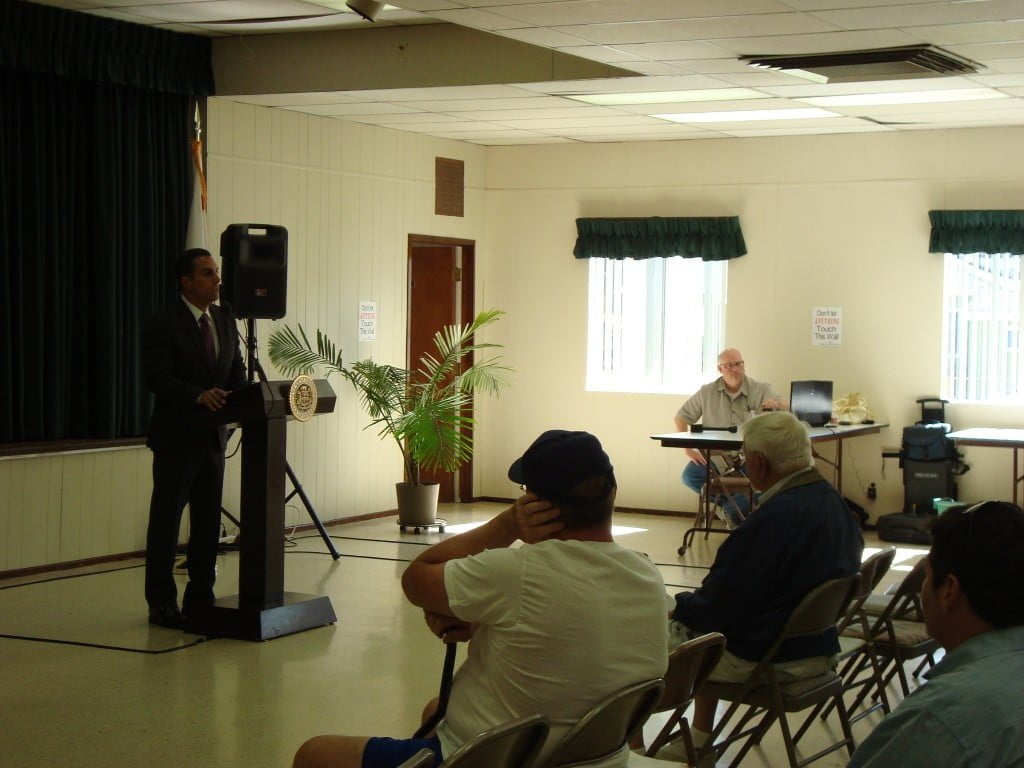A sunlit Burbank church on a Saturday afternoon was the site of a town hall meeting hosted by Assemblyman Mike Gatto, as he addressed his constituents’ concerns in a lengthy Q & A session. People came from across Southern California to see or speak to the assemblyman, while others merely walked up the block from the houses surrounding the 1700 of N. Avon Street.
Gatto began with a brief explanation of what an assemblyman does, noting that many people might not know, including one man at an airport who asked Gatto what he assembles for a living.
“But I’m not here to give a big, lengthy exposition on what I do,” said Gatto. “I’m here primarily to listen.”
Audience members were invited in groups of five picked at random to ask Gatto questions. The assemblyman fielded questions on a variety of topics, displaying the jack-of-all-trades capabilities of the modern day politician.
Several questions presented frustrations with CALTRANS, whether lack of maintenance or maintenance projects causing traffic issues.
Gatto did not mask his personal concerns with CALTRANS.
“My wife tells me I should retire from the legislature and become the president of CALTRANS because I get so frustrated with these things,” he said.
Gatto said his office does work to disseminate information to the public about CALTRANS maintenance in order to prevent commuting disruptions from unknown maintenance on freeways and streets. Gatto also said they hold regular meetings with CALTRANS officials that are open to the public and encouraged audience members to join in whenever possible.
Some questioned the reasoning behind certain laws, such as a woman who asked Gatto why carpool fines are high and texting while driving laws are comparatively low ($20 for a first offense), especially considering the latter’s safety implications.
Gatto admitted that the texting fine was low, though he also said it typically would amount to nearly $200 with court and processing fees.
“I’m very hesitant to say that I want to raise any type of fine,” said Gatto. “But we’ve got to do more with distracted driving and I agree that raising that fine is a pretty reasonable step.”
Gatto also addressed funding cuts to various programs including education and in-home support services.
One man asked Gatto about cuts to in-home support services that have made it more difficult to care for his bedridden mother.
“The bad news is yes, the program has been very hurt with recent cuts, but the positive thing is that the cuts are done. I’m pretty sure that we’re not going to be cutting that program anymore,” Gatto responded. “I’m not sure that there is money next year to restore the money that has been cut, but I do think that California has been able to right its fiscal house. I think we’re on the right track.”
Gatto was also asked how he felt the state should approach spending. His suggestion of a rainy day fund was something Gatto said California needs and many other states have.
“The way that we tax people is very, very choppy,” he said. “We’re heavily reliant on income tax and a component of the income tax is capital gains, which only occur when the stock market and housing markets are riding high. The state of California suffers disproportionately when there’s a downturn.”
Gatto also said the state needed to stray from ballot box budgeting or legislating.
“In California, there has been a ballot initiative or a federal court decision that mandates spending for every major state expenditure except for two: higher education and the court system.”
Gatto charged ballot box budgeting with tying representatives’ hands regarding spending decisions.
“I’m trying to make it harder to put junk in the [state] constitution,” he said. “Government reform is one of the main reasons why I ran. Nothing frustrates me more than seeing a system that does not work or does not serve the people that it’s supposed to.”

